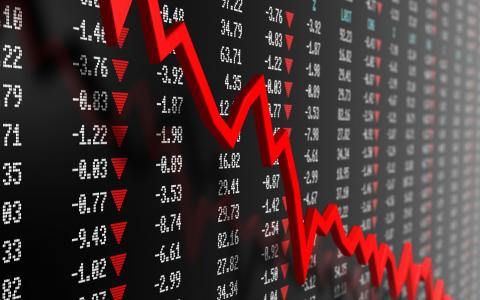
(Bloomberg) It’s probably best to take the selloff late Friday as the pointer to what comes next for the world’s financial markets as they limp toward the end of the month.
After a three-day rally that helped the S&P 500 Index register its best week since March 2009 and kept 10-year Treasury yields within a modest 20 basis-point span, selling resumed across risk assets. Nervousness is showing through despite $2 trillion of stimulus and unlimited central bank support to relieve a shortage of dollars as the coronavirus pandemic enfeebles the global economy.
“Without medical breakthroughs of some kind, the next few weeks could be challenging for markets as we price in a deep global recession,” a Goldman Sachs Group Inc. team including New York-based Zach Pandl, co-head of global and emerging-market strategy, wrote on Friday. “We are about to find out” if the stimulus efforts are enough, they said, recommending currency investors stick to havens such as the dollar, yen and Swiss franc.
Quarter-end strains may add to the skittishness on Monday and Tuesday, as banks and other entities rein in collateral lending to shore up balance sheets. The VIX Index, Wall Street’s so-called fear gauge, jumped the most in almost two weeks Friday, ending the day above 60. Its average this century is below 20.
Another concern will be the chaos in global oil markets, as nationwide lockdowns and travel restrictions crush demand for energy. Brent crude is heading for its worst quarter on record, having plunged 62% since the end of December. Oil traders say it will probably get worse this week.
The following are analyst comments on what to expect in the coming week:
Zach Pandl and team at Goldman Sachs.
- “In the West, the economic fallout from the outbreak is only just beginning. Markets may be able to look through some pretty horrible economic data -- like the non-reaction to the historic spike in U.S. jobless claims last week -- but will likely be sensitive to news on the duration of shutdowns.
- “We do see a light at the end of the tunnel: there is still a reasonably strong argument for a V-shaped recovery, and policy makers are working hard to bring about that outcome.
- “Our best guess is that the historic rally is not quite over.”
Nasser Saidi, Nasser Saidi & Associates president.
- “Emerging-market currencies, particularly those with high levels of debt and very low growth prospects, like South Africa, will be pressured; but also other countries like Taiwan, and others that have seen large outflows. All of those currencies are going to be exposed; the Aussie dollar as well.”
Aditya Pugalia, director of financial markets research at Emirates NBD PJSC in Dubai.
- “Uncertainty over the length and depth of the viral outbreak remains a dominant concern for investors.
- “The focus this week will remain on various governmental efforts to fight the physical and economic impact of coronavirus. Investors will also be keeping an eye on economic data to gauge the intensity of damage to the global economy.”
Stephane Monier, the chief investment officer at Banque Lombard Odier & Cie SA.
- “We fully expect the monetary and fiscal response to the coronavirus to lead to a rebound in economic activity and markets in the months ahead, along with a recovery in oil demand. However, if global storage reaches capacity in the second quarter of the year, we may see an even more brutal, but temporary, decline in oil prices.”
- “For now, the oil market is balancing two unknowns: the evolution of demand as the world economy comes to terms with the impact of the coronavirus, and the damage that Russia and Saudi Arabia are willing to inflict in their tussle. While that dynamic plays out, oil prices will continue to see heightened volatility. A year from now, we expect prices to trade around $40 per barrel.”
Martin Enlund, Andreas Steno Larsen and Joachim Bernhardsen, analysts at Nordea Bank ABP.
- “All the announced packages are good news since they limit downside risks. But insofar that market participants think fiscal or monetary moves will fix the situation, they may be wrong-footed within weeks. We go long dollar-baht and short Swiss franc-yen.”
- “A lot of the recent good stimulus news are now priced in; some market participants and Trump may be in a for a rude awakening in terms of the impact from the virus.”
- “Dollar-positive re-balancing flows could hold U.S. equities back going into April; and the money pumped into the U.S. economy in the new stimulus bill may take a longer time to show up.”



